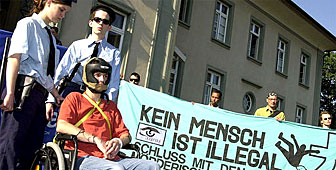Swiss plan special police deportation unit

Switzerland is planning to set up a special police unit to handle forced expulsions of foreign nationals. Two deportees have died in police custody in the past two years.
Under the proposal, a pool of “several dozen” officers from all 26 cantons would be trained to deal with forced deportations. They would be stationed with their respective cantonal police departments, but would be on call to deal with expulsions whenever they arise in Switzerland.
Beat Hegg, secretary-general of Switzerland’s cantonal justice and police departments, told swissinfo that two to four officers would be on permanent standby to handle the 30-60 forced expulsions carried out each year
Training would cover the whole deportation process from restraint techniques through to escorting deportees from Switzerland to their country of destination.
“The aim of this project is to find a solution for all cantons to enable them to conduct deportations in a uniform manner,” Hegg told swissinfo. “At the moment each canton is responsible for carrying out these deportations according to its own rules and regulations.”
An inter-governmental and cantonal taskforce, called Passager 2, was established in February this year with the specific task of establishing a coordinated response to the issue of forced expulsions. The group, which is headed by Jean-Daniel Gerber, head of the Federal Office for Refugees, includes representatives from the cantonal justice and police departments as well as experts from the medical profession.
Justice and police
Passager 2 is due to present its findings to the heads of all the cantons’ justice and police departments at a conference in the autumn. Adoption of the group’s recommendations would then be up to each individual canton.
Hegg said that while none of the cantons would be legally bound to follow the conference’s recommendations, he expected every canton to adopt the measures early next year.
High on the taskforce’s agenda is the issue of police restraint techniques. While police methods have not been directly blamed for the deaths of the two deportees, they have undoubtedly come under scrutiny.
In March 1999, a 27-year-old Palestinian asylum seeker, Khaled Abuzarifa, suffocated in a lift at Zurich airport after being bound and gagged by his police escort. A doctor was later given a five-month suspended sentence after being found guilty of negligence in the case.
Following the death of Abuzarifa, the human rights organisation, Amnesty International, called for better training of police and medical staff assisting in deportations.
Then in May this year a Nigerian asylum seeker, Samson Chukwu, suffocated at a detention centre in canton Valais after what the investigating magistrate, Jacques de Lavallaz, described as a “fatal chain of circumstances”.
Lavallaz cited a number of contributing factors to Chukwu’s death; among them was the method used by police to restrain the Nigerian: a police officer brought his weight to bear on the deportee’s back as Chukwu lay face down on the floor.
Police restraint techniques
Chukwu’s death again prompted Amnesty to urge all cantonal governments to review police restraint techniques and the relevant guidelines for police and medical personnel involved in deportation operations.
Amnesty also issued the justice ministry, the Federal Office for Refugees and the cantons its own set of guidelines aimed at minimising the risk of restraint asphyxia, and covering the use of sedative drugs and irritant sprays.
“Several cantons have already stopped using tranquilliser drugs and gags within the past few months,” Hegg told swissinfo. “The aim is certainly to avoid incidents like we had with these two deaths. We must find other solutions.
“Nevertheless we must find a way of deporting people who refuse to go. I can’t say what this will be, but the fact that someone doesn’t want to be deported cannot be a reason for not sending them home.”
The Swiss Refugee Agency, which has been critical of the handling of forced expulsions in the past, gave a cautious welcome to the idea of a specially-trained police deportation unit.
However Serge Houmard, based at the agency’s Lausanne office, said more details were needed on how the unit would operate and what guidelines it would follow. He said the agency was in the process of drawing up its own forced expulsion guidelines, which would be passed on to the cantonal authorities in due course.
“We would want deportees to be made aware of what restraint techniques might be used and what might happen to them if they refuse to cooperate,” said Houmard.
“We would also expect appropriate behaviour from the police in these cases. If force is really necessary it should be used in accordance with the guidelines laid down by the Swiss Medical Association.”
“We need to find a way forward to stop these deaths,” he added, “but at this point we don’t know whether these new measures will prevent further deaths.”
by Adam Beaumont

In compliance with the JTI standards
More: SWI swissinfo.ch certified by the Journalism Trust Initiative









You can find an overview of ongoing debates with our journalists here . Please join us!
If you want to start a conversation about a topic raised in this article or want to report factual errors, email us at english@swissinfo.ch.